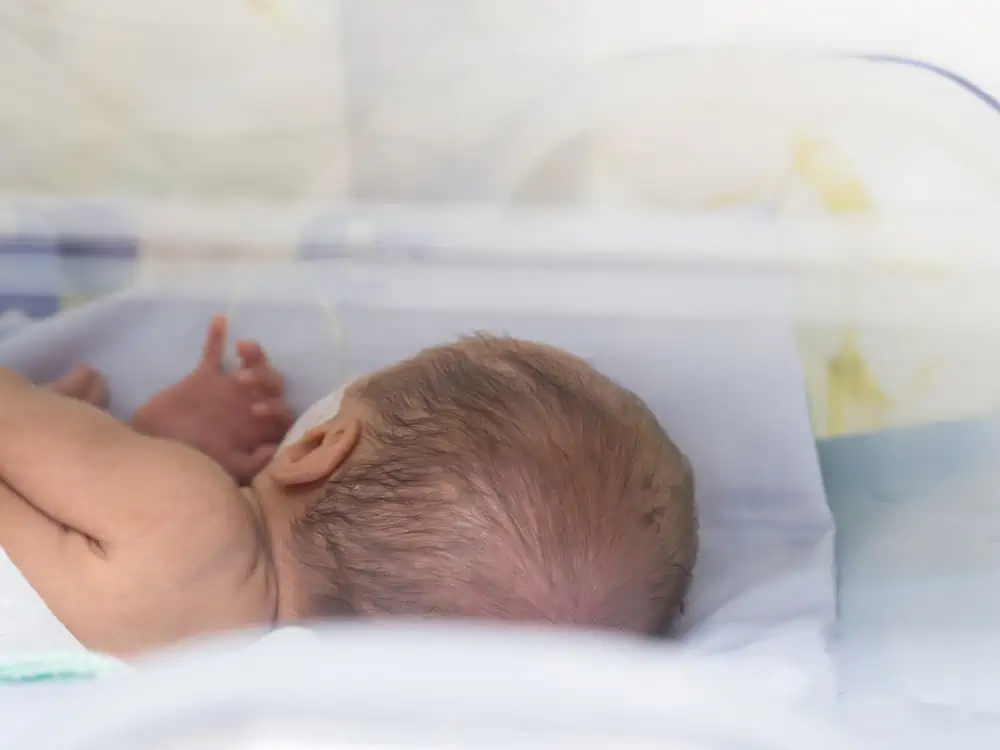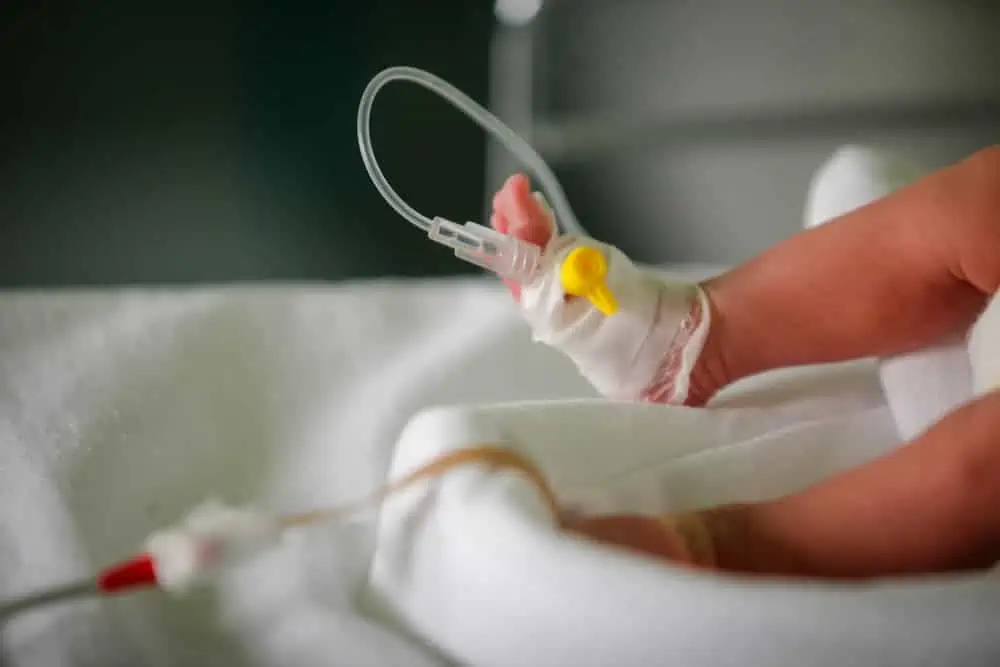What Is NEC in Premature Babies?
- Last Updated: July 27th, 2023

Attorney Jessica Paluch-Hoerman, founder of TruLaw, has over 28 years of experience as a personal injury and mass tort attorney, and previously worked as an international tax attorney at Deloitte. Jessie collaborates with attorneys nationwide — enabling her to share reliable, up-to-date legal information with our readers.
Legally Reviewed
This article has been written and reviewed for legal accuracy and clarity by the team of writers and legal experts at TruLaw and is as accurate as possible. This content should not be taken as legal advice from an attorney. If you would like to learn more about our owner and experienced injury lawyer, Jessie Paluch, you can do so here.
Fact-Checked
TruLaw does everything possible to make sure the information in this article is up to date and accurate. If you need specific legal advice about your case, contact us by using the chat on the bottom of this page. This article should not be taken as advice from an attorney.
What Is NEC in Premature Babies?
NEC, or necrotizing enterocolitis, is a serious disease that affects premature or underweight babies, particularly babies who were born before the 28th week of pregnancy.
NEC occurs in about one out of every 1000 premature infants and just one out of every 10,000 full-term infants.

Tragically, NEC can lead to complications, including intestinal strictures and gastrointestinal perforations.
Over time, the bacteria that caused the NEC can erode the delicate tissue in the infant’s intestinal lining, causing tissue death and, eventually, rupturing the intestinal wall.
If the intestines are ruptured, waste and bacteria can spill out of the intestines and into the abdomen, causing a severe infection.
It can also seep into an infant’s bloodstream.
Table of Contents
Causes of NEC in Premature Babies
 There are many potential causes of NEC, though physicians don’t fully understand precisely how it develops.
There are many potential causes of NEC, though physicians don’t fully understand precisely how it develops.
Premature infants have weaker immune systems than full-term infants, which can make it more difficult for them to fight off viruses and bacteria.
Premature babies also tend to have more trouble digesting food than full-term babies do.
Their weaker digestive systems, coupled with a weak immune system, make them especially vulnerable to infection.
Preterm infants also often have blood flow issues.
If their intestines can’t get enough oxygen through the blood, tissue damage can occur due to a buildup of dangerous bacteria in the intestine.
That bacteria can get into the infant’s bloodstream and cause a full-body infection.
Signs of NEC in Preterm Infants
If a premature baby contracts NEC, the symptoms might reveal themselves gradually or suddenly appear.
Premature infants with NEC typically begin showing symptoms two to six weeks after birth.
Some of the most common symptoms young babies experience include vomiting yellow and green substances, swelling in the abdomen, pain in the affected area, bloody feces, diarrhea, an inability to consume food, weight loss, and abnormal shifts in body temperature and heartbeat, fluctuating blood pressure, and general lethargy.
If your baby is displaying mild symptoms of an upset stomach, especially if your baby was not born prematurely, consider switching formulas to one more suitable for sensitive stomachs.
Common Complications of NEC
Left untreated, NEC can cause severe complications and lasting injuries.
One of the most common complications of NEC is peritonitis.
Peritonitis is an infection that occurs when a hole in the gastrointestinal tract allows bacteria to spill into the abdominal cavity.
Eventually, peritonitis can lead to a dangerous blood infection called sepsis.
Intestinal strictures are also common in NEC patients.
In fact, up to one in three babies with NEC suffers from an intestinal stricture.
A stricture is essentially just a narrowing of the intestinal tract.
Strictures can cause blockages and prevent food from being digested.
Many babies don’t develop strictures until a few months after they have recovered from NEC.
If an infant develops an intestinal stricture, they might have to have surgery to repair any blockages.
Other complications include short bowel syndrome, which usually occurs because of damage to the intestine.
Short bowel syndrome can lead to malabsorption, or the inability of the intestines to absorb nutrients from food.
This is a long-term condition that often requires ongoing care for the rest of the infant’s life to ensure they get all the nutrients they need.
Infants who contract NEC sometimes also experience stunted growth and other developmental delays, particularly if they had to undergo intestinal surgery as part of their treatment.
Available Treatments for NEC
When treating NEC, nurses will often stop oral feeding and instead use an IV to deliver the nutrients a baby needs directly into their bloodstream.
Many babies with NEC also receive fluids through an IV.
 Among the most common treatments for preterm infant NEC are antibiotics and nasogastric tubes.
Among the most common treatments for preterm infant NEC are antibiotics and nasogastric tubes.
Antibiotics can be given through an IV to kill the harmful bacteria residing in the intestine.
Nasogastric tubes can be used to eliminate gas bubbles from the digestive system.
They are typically inserted through the nose or mouth.
In more severe cases, surgery might be required.
About one in four premature infants with NEC requires surgery.
The purpose of surgery is to remove portions of the intestine that contain damaged, dead, or ruptured tissue.
In severe cases of NEC, a surgeon might disconnect and reroute the intestines out of the body through a hole in the child’s belly, known as a stoma.
This allows waste to pass out of the baby’s body without causing further damage to the intestinal tract and gives the intestines time to fully heal after surgery.
After a period that usually lasts no more than a month or two, the surgeon will reverse the procedure and reconnect the intestinal tract.
From that point on, the child should be able to pass waste normally.
Oral feeding can also resume as usual.
If you believe your baby developed NEC due to cow’s milk-based formulas such as Enfamil and Similac, you may be eligible to file a lawsuit, but you must act quickly and file a suit before the statue of limitations expires.
TruLaw and its team of seasoned lawyers fight on behalf of individuals harmed by drugs, devices, chemicals, and other products.
To date, TruLaw and its partner law firms have successfully collected over $3 billion through verdicts and settlements in all 50 states.
Use our Instant Case Evaluator to find out if you are eligible for a Necrotizing Enterocolitis (NEC) lawsuit today.

Managing Attorney & Owner
With over 25 years of legal experience, Jessica Paluch-Hoerman is an Illinois lawyer, a CPA, and a mother of three. She spent the first decade of her career working as an international tax attorney at Deloitte.
In 2009, Jessie co-founded her own law firm with her husband – which has scaled to over 30 employees since its conception.
In 2016, Jessie founded TruLaw, which allows her to collaborate with attorneys and legal experts across the United States on a daily basis. This hypervaluable network of experts is what enables her to share the most reliable, accurate, and up-to-date legal information with our readers!
Here, at TruLaw, we’re committed to helping victims get the justice they deserve.
Alongside our partner law firms, we have successfully collected over $3 Billion in verdicts and settlements on behalf of injured individuals.
Would you like our help?
At TruLaw, we fiercely combat corporations that endanger individuals’ well-being. If you’ve suffered injuries and believe these well-funded entities should be held accountable, we’re here for you.
With TruLaw, you gain access to successful and seasoned lawyers who maximize your chances of success. Our lawyers invest in you—they do not receive a dime until your lawsuit reaches a successful resolution!
AFFF Lawsuit claims are being filed against manufacturers of aqueous film-forming foam (AFFF), commonly used in firefighting.
Claims allege that companies such as 3M, DuPont, and Tyco Fire Products failed to adequately warn users about the potential dangers of AFFF exposure — including increased risks of various cancers and diseases.
Depo Provera Lawsuit claims are being filed by individuals who allege they developed meningioma (a type of brain tumor) after receiving Depo-Provera birth control injections.
A 2024 study found that women using Depo-Provera for at least 1 year are five times more likely to develop meningioma brain tumors compared to those not using the drug.
Suboxone Tooth Decay Lawsuit claims are being filed against Indivior, the manufacturer of Suboxone, a medication used to treat opioid addiction.
Claims allege that Indivior failed to adequately warn users about the potential dangers of severe tooth decay and dental injuries associated with Suboxone’s sublingual film version.
Social Media Harm Lawsuits are being filed against social media companies for allegedly causing mental health issues in children and teens.
Claims allege that companies like Meta, Google, ByteDance, and Snap designed addictive platforms that led to anxiety, depression, and other mental health issues without adequately warning users or parents.
Transvaginal Mesh Lawsuits are being filed against manufacturers of transvaginal mesh products used to treat pelvic organ prolapse (POP) and stress urinary incontinence (SUI).
Claims allege that companies like Ethicon, C.R. Bard, and Boston Scientific failed to adequately warn about potential dangers — including erosion, pain, and infection.
Bair Hugger Warming Blanket Lawsuits involve claims against 3M — alleging their surgical warming blankets caused severe infections and complications (particularly in hip and knee replacement surgeries).
Plaintiffs claim 3M failed to warn about potential risks — despite knowing about increased risk of deep joint infections since 2011.
Baby Formula NEC Lawsuit claims are being filed against manufacturers of cow’s milk-based baby formula products.
Claims allege that companies like Abbott Laboratories (Similac) and Mead Johnson & Company (Enfamil) failed to warn about the increased risk of necrotizing enterocolitis (NEC) in premature infants.
Here, at TruLaw, we’re committed to helping victims get the justice they deserve.
Alongside our partner law firms, we have successfully collected over $3 Billion in verdicts and settlements on behalf of injured individuals.
Would you like our help?












